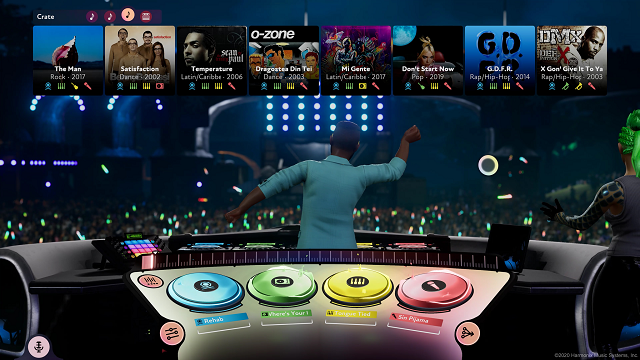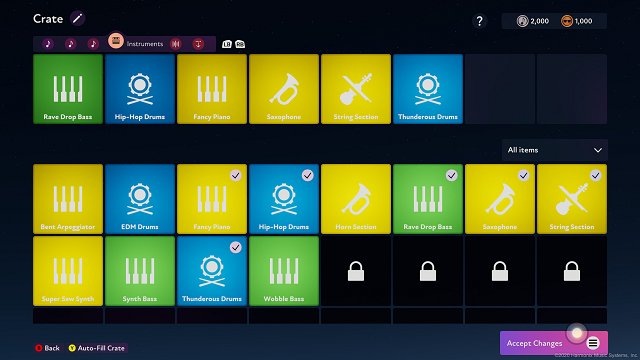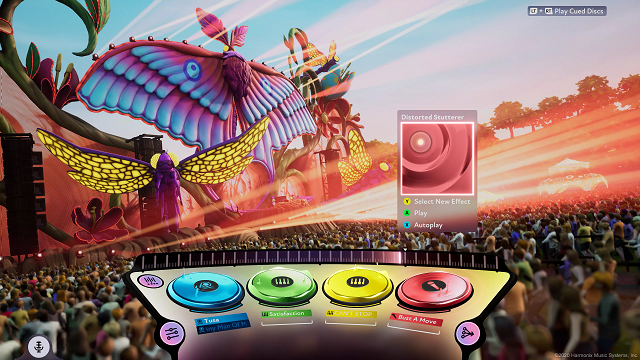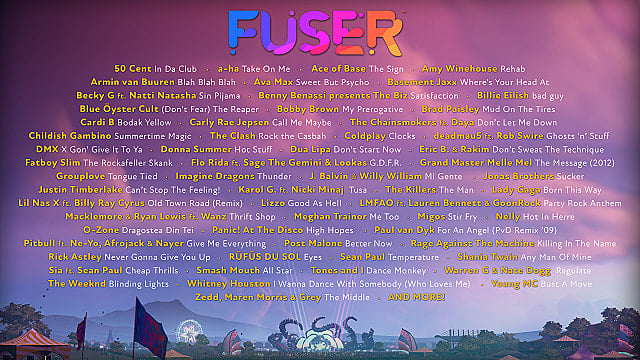The Harmonix staff opened their remote press preview for FUSER by throwing a surprising amount of shade at the rhythm game genre. Despite countless innovations, there is an unshakable truth lying at the heart of nearly every single rhythm game: there is very little room for creativity.
A perfect score in any given Rock Band or Guitar Hero song will always sound the same, no matter who is playing it. There’s no real space for the stuff that makes music special. Scoring is prescriptive, and there’s no real room for true self-expression.
I can’t speak for anybody else that was on the Discord call for the preview, but it was stunning to hear the rhythm game genre’s most recognizable company laying out, in very clear terms, one of the genre’s biggest failings, one that extended to the majority of the games that Harmonix themselves have made.
It was even more stunning to hear them claim that with FUSER, they think they’ve solved the problem.
So far, it seems like they weren’t lying.
FUSER Hands-On Preview: A Music Festival at Home

Self-expression is woven into every aspect of FUSER.
At first blush, FUSER appears similar to Harmonix’s cult hit Dropmix, a board game/card game hybrid that challenged players to make wild mashups by mixing and matching different parts of different songs.
The core gameplay of FUSER is the same. The game features over 100 songs, and each of them has been divided into different tracks for drums, bass instruments, lead instruments, and vocals. The game uses some really impressive beat and key-matching software to match all of them to one another, allowing you to create endless mashups of your own.
But where Dropmix separated score and creativity, FUSER attempts to connect the two. When you jump into the game, you’ll be taught how to drop tracks on the beat, eject them on the beat, and change up the mix.
The game never forces you to drop a certain track in a certain place to boost your score; specific score-boosting “audience requests” encourage you to play a particular song, but it’s up to you what track from the song you use and where you put it in your unique mix.
Self-expression is woven into every aspect of FUSER. The developers have created a pretty robust DJ customization system where no option is locked to a gender binary, allowing players to express themselves however they want. Players can customize stage projections and pyrotechnics along with their selected songs, effects, and instruments to make the whole show their own.

FUSER isn’t just a game, it’s also kind of a digital audio workstation.
Speaking of instruments, not only does the game feature hundreds of songs, each with multiple tracks that allow for millions of possible permutations, but it also features a wide variety of instruments, each with dozens of loops that you can switch between at any time, essentially composing your own instrument track.
Ditto for live DJ effects like stuttering and filtering. Doing all of this to the beat isn’t just creative, nor does it just sound great, but most importantly, it’s integral to getting a high score.
As you progress through FUSER, it becomes clear that it’s a misnomer to call it a rhythm game. There’s DNA from programs like FruityLoops and Reason here. It’s simplified, yes, but FUSER isn’t just a game, it’s also kind of a digital audio workstation.
Sharing is Caring

It scratches a very human itch: you’re making something creative with other people.
And what’s a DAW without the ability to edit and export your work?
FUSER takes a bit of inspiration from modern racing games and implements a rewind system in the game’s sandbox-style Freestyle mode, where you can clip a particularly chef’s-kiss-beautiful portion of your mix, rewind it, and perfect it bit-by-bit until everything sounds perfect.
At the end, you can post the mix to your own FUSER profile, but you can also natively export the mix to social media in the game as well. In a world where the next in-person music festival might be years away, this is very, very much appreciated.
The game also includes cooperative and competitive multiplayer, though I foresee the cooperative multiplayer becoming more popular, as players all work together to refine a mix until it’s headbang-worthy. It scratches a very human itch: you’re making something creative with other people. Together. And you can all save your work at the end and share it with folks!
November Can’t Come Soon Enough
FUSER is so much more than a spiritual successor to DropMix; it represents a massive shift in what a rhythm game can actually be.
Oddly enough, it’s kind of reminiscent of how the Jackbox Party Packs reinvigorated the party game genre by tying creativity to gameplay elements in a cohesive way.
It seems like such a small, insignificant thing, but the overall effect is that when you’re really locked in, not only do you achieve that ascendant state of rhythm game flow, but you also have a deep soul satisfaction at doing something creative. It’s akin to singing karaoke with friends and having a whole room cheer for you, or dancing at a club where nobody cares how much of an idiot you look like.
It’s hard to explain if you haven’t played the game, but suffice it to say, it’s an incredible experience to be making the music that you’re losing yourself in.
I can only hope that the final product lives up to the expectations the limited demo has set. FUSER is set to release November 10 for PC, PS4, Xbox One, and Nintendo Switch.







Published: Sep 10, 2020 05:12 pm